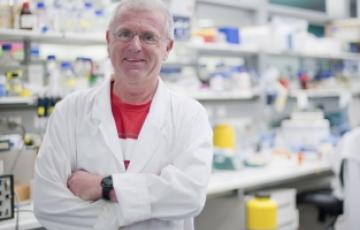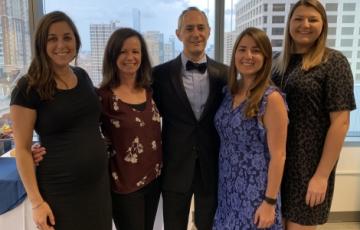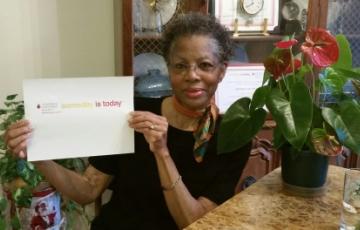Search Results
Signs and Symptoms
Children who have juvenile myelomonocytic leukemia (JMML) may have the following signs and symptoms:
- Difficulty breathing and/or dry cough
- Enlarged lymph nodes
- Abdominal pain and loss of appetite caused by enlarged kidney, liver and/or spleen
- Bone and joint pain
- Fatigue and pale skin (from low level of red blood cells)
- Easy bruising and bleeding (from low level of platelets)
- Frequent infections (from low level of white blood cells)
Some children also have skin changes which can include
Signs and Symptoms
The signs and symptoms of hairy cell leukemia aren't specific and are common to other, less serious illnesses. However, if you're troubled by any of the following symptoms, see your doctor:
Follow-Up Care
Click here for information about follow-up care, including what to expect, long-term and late effects of treatment, survivorship clinics, and other resources such as The National Comprehensive Cancer Network (NCCN) treatment guidelines.
Related Links- Download or order The Leukemia & Lymphoma Society's free booklet, Chronic Myelomonocytic Leukemia (CMML) and Juvenile Myelomonocytic Leukemia (JMML)

Andreas Strasser, Ph.D., MSc, FAA
A Pioneering Researcher Developing Targeted Therapies for Leukemia, Lymphoma and Myeloma
A cancer researcher trained in cell biology, immunology and molecular oncology, Dr. Strasser has made major contributions leading to discoveries that have found that defects in cell death can cause cancer and impair responses to chemotherapy. With this knowledge, his research team is able to develop new treatments.
Diagnosis
Diagnosing acute lymphoblastic leukemia (ALL) and your ALL subtype usually involves a series of tests. An accurate diagnosis of the subtype is important. The exact diagnosis helps the doctor
Signs and Symptoms
Signs and symptoms are changes in the body that may indicate disease. A sign is a change that the doctor sees during an examination or on a laboratory test result. A symptom is a change that a patient can see and/or feel. A person who has signs or symptoms that suggest the possibility of leukemia is usually referred to a specialist. This is a hematologist-oncologist. A hematologist-oncologist is a doctor who has special training in diagnosing and treating blood cancers such as leukemia, lymphoma and myeloma.
Blastic Plasmacytoid Dendritic Cell Neoplasm
For personalized disease and treatment information, or to learn about clinical trials, contact one of The Leukemia & Lymphoma Society's (LLS's) Information Specialists at (800) 955-4572. BackgroundBlastic plasmacytoid dendritic cell neoplasm (BPDCN) was previously known as natural killer (NK) cell leukemia/lymphoma. As understanding of the biology and origin of this malignancy has improved, the World Health Organization (WHO) established the term blastic plasmacytoid dendritic cell neoplasm (BPDCN) in 2008.
Sarah
My daughter Sarah was a fun, smart, and scrappy kid. She was a great student, was involved in Student Council, was President of her class, played in the marching band, and played rugby. She had caught a cold around Thanksgiving of 2010. By December 7, she was in the hospital. We were told she had acute myeloid leukemia (AML). I wasn’t even sure what leukemia was, but I knew it was serious. I was hoping in a few months she would be okay, and we would move on with life.

Brian
Our family has once again joined the fight to beat leukemia and lymphoma together with the support of The Leukemia & Lymphoma Society (LLS). I am a cancer survivor who comes from a family that, for three generations, has had eight family members with solid tumors or blood cancers. We understand cancer; we will never give up the fight.

Preston
Preston was a regular 12-year-old kid who loved being active and was obsessed with playing basketball. He got sick in August and was still having a hard time recovering in late September. We realized he needed a thorough check-up and decided to bypass the doctor’s office and go directly to the ER. He had been extremely lethargic and was losing weight. His lips were pale, and his body was cold to the touch.
Bishoy
Leukemia Survivor Travels From Egypt to Receive Treatment
At just three years old, Bishoy’s parents uprooted him and his family from Egypt to America after he was diagnosed with acute lymphoblastic leukemia. He underwent treatment for most of his childhood until finally receiving a clean bill of health at thirteen years old.

Michael
I’m Michael and I’m a two time leukemia survivor. My story is the force that drives me, fuels my energy, and led me to challenge myself to jump rope 1,000,000 skips in 2020. I’m doing it to bring awareness to blood cancer and raise money for LLS. When I heard, “Michael, we have your blood test results. We’ve arranged for your hospital admittance. Please go there now,” I thought ”This can’t be right”. Two days later on Thanksgiving, I had my diagnosis – hairy cell leukemia.

Aiden
Aiden and his identical twin brother, Mason, were born perfectly healthy at 37 weeks. They were great babies and were rarely ever sick. They hit all their milestones on time and were thriving. When they were 2½ years old, I started looking into preschools in the area to begin their education.

Elmer
Hey, I appreciate the work of The Leukemia & Lymphoma Society (LLS). I did the Facebook fundraiser in honor of my friend Mr. Larry in Florida who is now in remission after being diagnosed with leukemia. He’s a dear friend of mine, and he has a lot of courage and determination to beat this illness. I wanted to do this to help raise money for LLS and for all those who face an uncertain future. I’m planning to do 31 days instead of just 21 because I feel many people exceeded their miles per day in very cold conditions while I just walked mine inside on the job where I walk a lot.
Diagnosis
Diagnosing juvenile myelomonocytic leukemia (JMML) usually involves ruling out other similar diseases such as chronic myelomonocytic leukemia and chronic myeloid leukemia, especially if your child is older than 6 years. Doctors commonly use blood tests and bone marrow tests to diagnose JMML.
The tests used to diagnose JMML include:

Judy
Meet Judy, a leukemia survivor, and teacher. Given a death sentence of chronic myeloid leukemia (CML), Oregon native Judy prepared to have her ashes scattered on Mt. Hood. But her participation in the phase one clinical trial for the miracle drug Gleevec® gave her a new life.
Doug
On July 16, 2014 I had just finished eating out at our local diner. When standing at the register to pay, my defibrillator fired and an ambulance was called. Within two hours of arriving at the emergency room I found out I had leukemia. I had had no symptoms other than the lab work that showed the disease. I was in disbelief when I heard the words "very aggressive form of acute promyelocytic leukemia (APL)." By the next afternoon I was started on a heavy regiment of arsenic and ATRA chemotherapy treatment.
Johanna
I am a teacher from Texas. My journey to Team and Training wasn’t immediate. I moved to Texas from Louisiana. When I moved to Texas, I decided to start running to meet people and to help with my homesickness.
CMML Subtypes
Most people diagnosed with chronic myelomonocytic leukemia (CMML) have one of three different subtypes of CMML. Doctors classify CMML subtypes by the percentage of blast cells ("blasts") in the blood and bone marrow.
Doctors use a classification system developed by the World Health Organization (WHO) in 2001 and updated in 2016. The three subtypes are:
Chemotherapy and Drug Therapy
If you're being treated for chronic myelomonocytic leukemia (CMML), your first line of defense may be drug therapy. You'll be given potent drugs that must be toxic enough to damage or kill the cancer cells. At the same time, these drugs take aim at normal cells and cause side effects. Yet, not everyone experiences side effects and people react differently.
Drugs Used for CMMLThere is no one standard treatment for CMML. There are three FDA approved treatments for patients, which include:

Dorothy
Dorothy Spriggs was diagnosed with chronic myeloid leukemia (CML) in 1999 and is currently doing well.
Since 2011, “Ms. Dottie” has volunteered with the Baltimore chapter of The Leukemia & Lymphoma Society. She does office work regularly, participates in events and volunteers as a peer counselor to support others living with the same diagnosis.

Gary
My stepdad Gary passed away from leukemia on October 18, 2023. He began feeling ill in September 2023 ― lightheaded and dizzy. He took himself to the hospital, and after several weeks of testing, he was diagnosed with acute myeloid leukemia (AML) on October 3. He was told he could do treatment, and there was a chance to beat it. He and my mom went to the hospital the next morning to start treatment. On this morning, October 4, the doctor told them that it was a rare variant, acute erythroid leukemia, and there really weren’t any treatment options.

Forest
In September 2017, our world crashed when I was diagnosed with acute lymphoblastic leukemia (ALL). Over the next several years, I experienced numerous chemotherapy sessions, radiation treatments, a stem cell transplant, many side effects, infections, and another cancer. There were moments when I felt near death. Despite these difficulties, our Christian faith was a source of strength and hope throughout this journey. We decided to write a book about our faith journey through leukemia.

Janet
I support LLS because leukemia and lymphoma has impacted my family. On Mother’s Day in 2006, my cousin's six year-old daughter, Sydney was diagnosed with acute myeloid leukemia (AML). After a year of fighting so hard, Sydney passed away.
The doctors at the New York Hospital were amazed and acknowledge that because Sydney did not give up and she fought such a painful battle, she had done so much for the advancement of research in leukemia.
Chuck
Meet Chuck a leukemia survivor. He is the Indianapolis Colts Head Coach, "My condition was leukemia. But my position was, I'm walking out of here. For everybody who's battling this disease, for everybody who's going to battle this disease, I would just say, look, your attitude's got to be one of, I'm gonna beat it."